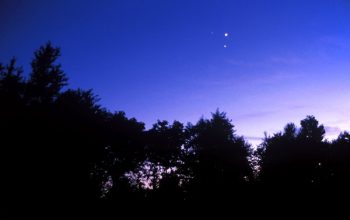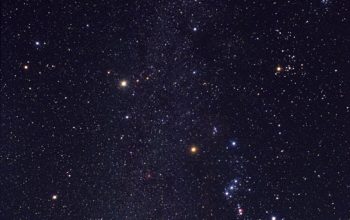Sunday, January 15th: The Misnomer of the Summer Triangle
The Summer Triangle may still be seen during January low in the northwest. This asterism, or pattern of stars, has three stars: Vega, Deneb, and Altair. Vega is the fifth brightest star in the sky and the brightest star in the triangle. Deneb symbolizes the top of another asterism, the Northern Cross, which is positioned straight up from the northwest horizon.
Monday, January 16th: Venus and Mars
At twilight, find Mars by looking to the upper left of Venus about 30 degrees above the southwest horizon. Mars shines at a magnitude 1.0, while Venus is much brighter at a magnitude -4.6.
Tuesday, January 17th: Opposition of Vesta
Asteroid 4 Vesta is the brightest minor planet of 2017 and reaches opposition tonight. It shines at a magnitude 6.2, bright enough to be seen with binoculars. Finding Vesta may take some patience. Begin at Castor in Northern Gemini, and follow a line from Castor to Pollux. Then continue south/southeast until you reach Mu (m) Cancri. Once there, Vesta is only 2.2 degrees to the northwest of Mu.
Wednesday, January 18th: Jupiter and Spica
Jupiter and the star Spica measure only a few degrees apart tonight. After midnight, the pair will be accompanied by the nearly Last-Quarter Moon.
Thursday, January 19th: Last Quarter Moon
At the 5:13 p.m. EST, the Last Quarter Moon occurs.
Friday, January 20th: Orion the Hunter and Sirius
The constellation Orion the Hunter continues to dominate the winter sky for nearly the entire night. It rises in the southeast after nightfall. If you trace directly from the bottom of Orion’s belt, Sirius the Dog star shines bright below.
Saturday, January 21th: Moon reaches Apogee
At 7:14 p.m. EST, the Moon reaches apogee, the farthest point in its orbit around Earth.
Sunday, January 22nd: The Pleiades and Hyades
The Pleiades star cluster, also known as the “Seven Sisters”, along with the Hyades glimmer in the southern skies well past midnight. They can be seen in clear skies with the naked eye. Hyades is a part of the head of the constellation Taurus the Bull.
Published by Julia Mariani
Sources: Sky and Telescope, Astronomy Magazine


